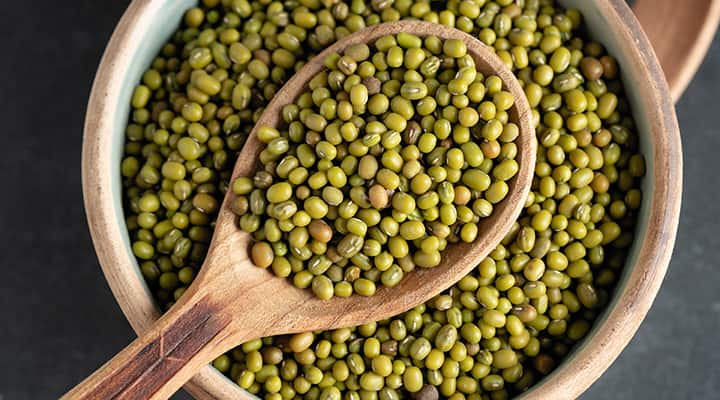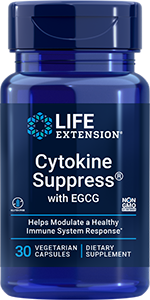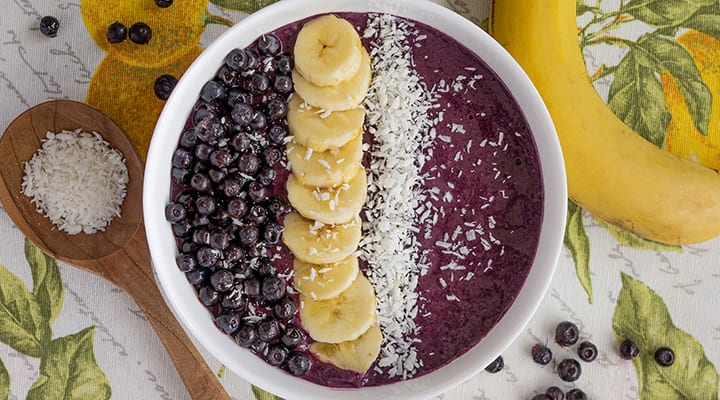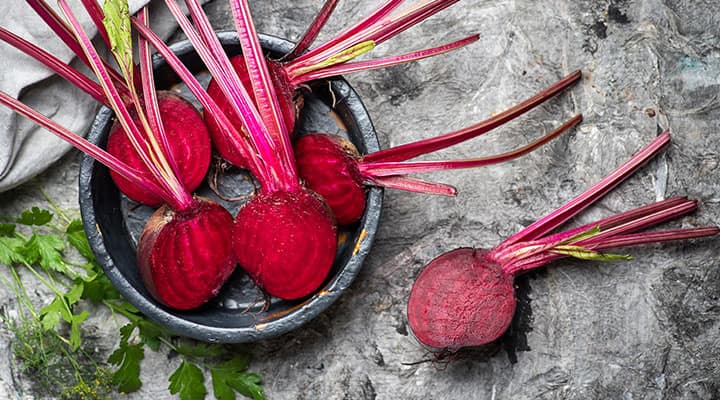
What Are the Health Benefits of Vitexin?
Published: October 2021
From buckwheat to mung beans, vitexin is an antioxidant found in a number of plants. It's also an important ingredient in supplements that support a healthy inflammatory response, and promote cytokine balance. Fans of this flavonoid praise it for everything from benefiting the brain and heart to helping maintain already-healthy blood sugar levels.
So what is vitexin, exactly…and will it help you live a healthier life?
What is vitexin?

Vitexin is an antioxidant flavonoid occurring in mung bean and other edible plants…although to be fair, these aren't foods you'll find in the typical American kitchen. It's sought after in the supplement world because it's a compound that has antioxidant activity. Vitexin and other flavonoids help quench free radicals, which supports your overall health.
What are the health benefits of vitexin?
Vitexin's health benefits aren't limited to just one part of the body or system. In fact, research suggests this flavonoid may support wellness in a variety of different ways:
- Has antioxidant activity
- May support brain health
- Helps promote a healthy inflammatory response
- Supports already-healthy blood sugar levels
- Helps maintain heart health
- May inhibit signs of aging
Best sources of vitexin: food vs. supplements
If you're curious about how you can add vitexin to your stay-well strategy, you're in luck. Beside mung bean seed coat, vitexin is found in passionflower, chaste tree (Vitex agnus-castus), cucumber, pearl millet (the most widely grown millet), hawthorn berries, fenugreek seeds, wild green oats and other plants. Liquid and encapsulated standardized extracts from some of these plants provide a concentrated source of their active components, including vitexin.
What are vitexin's antioxidant properties?

One of the most valuable things about vitexin appears to be its antioxidant activity in the body. Obtained from the food we eat, or made in the body, antioxidants are compounds which neutralize the activity of free radicals, which may be generated in response to everything from everyday stress to preservatives in our food.
Why do we need antioxidants to fight those free radicals? When you don't have enough antioxidants to balance out one group of free radicals, known as reactive oxygen species, it results in oxidative stress. This imbalance of free radicals and the body's ability to neutralize them can impact your health. In fact, the “free radical theory of aging” suggests free radicals may be associated with age-related implications of growing older.
Research shows that vitexin is a helpful antioxidant that protects against oxidative stress. In an experiment in which free radicals was induced in red blood cells, the administration of vitexin was associated with enhanced antioxidant enzyme activity.
Why vitexin is a smart choice for brain health
Vitexin has been associated with several neuroprotective effects. In rats, vitexin supported memory. When given an extract of passionflower, which is a significant source of vitexin, it supported the area of the brain involved in memory in mice.
Promoting a healthy inflammatory response with vitexin

Research has shown that vitexin can help promote a healthy inflammatory response. Polyphenols such as vitexin have been shown to support a healthy inflammatory response.
In a study involving mice, vitexin helped inhibit inflammation to promote whole-body health. In another experiment, it was found that vitexin supported white blood cell health.
Does vitexin help suppress my cytokines?
Vitexin has been shown to support healthy production of cytokines. What are cytokines? Cytokines are molecules released by cells to signal to the immune system that the body needs to initiate a healthy response. Sometimes our bodies overproduce cytokines, however, so it's important to maintain a healthy balance. Having an optimal balance of cytokines is important to support a healthy inflammatory response.
Here's where vitexin comes in. In one study, vitexin helped support healthy expression of the cytokines in human cartilage cells, which means this antioxidant may help support healthy joints.
Meanwhile, in mice, vitexin helped support a healthy inflammatory response and normalized cytokine release. And in another rodent study, the administration of vitexin helped support the healthy production of cytokines associated with occasional discomfort.
Vitexin may help maintain healthy levels of a protein known as HMGB1 which can induce production of cytokines. Like vitexin, research has revealed that EGCG, a major beneficial component of green tea, also has this property. Adding EGCG to a vitexin supplement may help maintain a healthy cytokine response.
Explore Our Best Inflammation Health Support Supplements
Another sweet benefit of vitexin

Laboratory research has found that vitexin supported an already-healthy level of blood glucose (blood sugar) after mice were fed table sugar; it accomplished this by inhibiting an enzyme known as alpha-glucosidase which converts carbohydrates we consume into glucose.
Vitexin has also been shown to support the cells of the pancreas that produce insulin. So if your goal is to keep your already-normal blood sugar levels healthy, this antioxidant may be worth adding to your supplement routine.
Vitexin's heart health benefits
Trying to keep your heart healthy? Vitexin may help support the heart in addition to other health benefits. It is one of the major recognized flavonoids in hawthorn berries, a plant that has been traditionally used to promote heart health—in fact, vitexin is one of the flavonoids believed to be responsible for hawthorn's benefit to the heart.
You can find hawthorn in heart health supplements like Cardio Peak™.
Could vitexin delay aging?

Some studies suggest that vitexin may help keep us young…or at least, age gracefully! In mice that were given vitexin to fight accelerated aging, vitexin was linked to better overall health, including higher levels of antioxidants. Not only that, but the aged mice who were given vitexin actually looked and acted more youthful—their hair color and luster improved, and they became more active.
How should I take vitexin?
You can find vitexin in some foods like mung beans, but chances are, you don't eat this (or hawthorn berries) as part of your average diet. It may be more convenient to use a vitexin supplement that contain a standardized extract of sources of vitexin, such as mung bean extract or hawthorn extract that provide a significant amount of vitexin, with or without complementary ingredients.
Is vitexin good for women's health?

Chaste tree berry (Vitex agnus castus), which is a source of vitexin, has a history of use by perimenopausal or postmenopausal women (who experience hot flashes and other discomforts) to promote comfort. It is also used by premenopausal women with PMS symptoms to support wellbeing.
An analysis of clinical trials found that consuming chaste tree berry was associated with premenstrual support in 13 of 14 trials. According to a recent review, chasteberry may benefit women in menopause, also. However, the components of chaste tree berry that may be responsible for these effects have not yet been identified.
What are the side effects of vitexin?
While potential side effects of a vitexin supplement have not been thoroughly investigated, plants that provide vitexin may be associated with side effects in some individuals when consumed in significant quantities. This is true of any herb, however.
People who are sensitive to beans, including mung, may experience gastrointestinal discomfort. However, it is the seed coat of the mung bean that contributes 95.6% of the total vitexin in mung and is the source of the mung bean extract used in nutritional supplements.
What's new in vitexin research?

In addition to the above-mentioned benefits, vitexin was recently shown to support liver health in mice. A study compared the effects of vitexin to no vitexin in mice that were given a high fat diet. Animals that received vitexin had healthy levels of fats and cholesterol in the serum and liver in comparison to untreated mice.
The researchers proposed that vitexin may support a healthy liver by activating AMPK, an enzyme that promotes energy balance and is used for weight management.
While vitexin may be an unfamiliar word to some people, science continues to reveal new findings related to the benefits of this and other plant nutrients. We anticipate more research that may lead to clinical trials to further explore the effects of this multifaceted flavonoid.
References
- Abbasi E et al. Chin J Physiol. 2013 Jun 30;56(3):184-9.
- An F et al. Neural Regen Res. 2012 Nov 25;7(33):2565-75.
- An F et al. Pharmazie. 2015 Nov;70(11):724-32.
- Babaei F et al. Food Sci Nutr. 2020 Jun; 8(6): 2569–2580.
- Babaei, Fatemeh. "Review of the effects of vitexin in oxidative stress‐related diseases." Food Sci Nutr., June 2020, https://www.ncbi.nlm.nih.gov/labs/pmc/articles/PMC7300089/
- Borghi SM et al. J Nat Prod. 2013 Jun 28;76(6):1141-9.
- Cayman Chemical. Safety data sheet Vitexin. https://www.caymanchem.com/msdss/15116m.pdf
- Choo CY et al. J Ethnopharmacol. 2012 Aug 1;142(3):776-81.
- Dong LY et al. Am J Chin Med. 2013;41(6):1251-66.
- Edwards JE et al. Phytochemistry. 2012 Jul;79:5-26.
- Gadioli IL et al. Crit Rev Food Sci Nutr. 2018 Mar 24;58(5):785-807.
- Ganesan K et al. Ann N Y Acad Sci. 2017 Aug;1401(1):102-113.
- Ganesan K et al. Food Sci Human Wellness. 2018 Mar;7(1):11-33.
- Gupta SC et al. Arch Biochem Biophys. 2014 Oct 1;559:91-9.
- Hashiuchi A et al. J Proteomics. 2017 May 24;161:26-37.
- He M et al. Fitoterapia. 2016 Dec;115:74-85.
- Hou D et al. Nutrients. 2019 May 31;11(6):1238.
- Inamdar S et al. Biochem Biophys Res Commun. 2019 Oct 29;519(1):106-112.
- Ju LY. Zhongguo Zhong Yao Za Zhi. 2005 Apr;30(8):634-40.
- Juturu V. Polyphenols in Human Health and Disease. 2014.
- Kartnig T et al. Planta Med. 1993 Dec;59(6):537-8.
- Kim GH et al. J Chem Neuroanat. 2019 Jul;98:27-40.
- Li S et al. Free Radic Biol Med. 2021 Aug 1;171:332-344.
- Li W et al. PLoS One. 2007 Nov 7;2(11):e1153.
- Lima LKF et al. Biomed Res Int. 2018 Dec 5;2018:4785089.
- Molaia M et al. Gynecol Endocrinol. 2019 Jan;35(1):58-61.
- Mukherjee PK et al. Fitoterapia. 2013 Jan;84:227-36.
- Nikfarjam BA et al. J Pharmacopuncture. 2017 Jun; 20(2): 127–131.
- Nikfarjam, Bahareh Abd et al. "Anti-inflammatory Effects of Quercetin and Vitexin on Activated Human Peripheral Blood Neutrophils." J Pharmacopuncture, June 2017, https://www.ncbi.nlm.nih.gov/labs/pmc/articles/PMC5532472/
- Peng Y et al. Crit Rev Food Sci Nutr. 2020 Apr 15;1-16.
- Putteeraj M et al. Curr Drug Targets. 2018;19(14):1710-1720.
- Shang M et al. Zhongguo Zhong Yao Za Zhi. 1998 Oct;23(10):614-6, 639.
- Van Die MD et al. J Altern Complement Med. 2009 Aug;15(8):853-62.
- Verkaik S et al. Am J Obstet Gynecol. 2017 Aug;217(2):150-166.
- Wang F et al. Mol Med Rep. 2017 Mar;15(3):1079-1086.
- Wong RHX et al. Nutrients. 2012 May; 4(5): 331–342.
- Yang H et al. Scand J Immunol. 2019 Aug;90(2):e12773.
- Yang, Hongpeng et al. "Vitexin alleviates interleukin-1β-induced inflammatory responses in chondrocytes from osteoarthritis patients: Involvement of HIF-1α pathway." Scandinavian Journal of Immunology, May 2019, https://onlinelibrary.wiley.com/doi/full/10.1111/sji.12773
- Yahaya MAF et al. J Immunol Res. 2020 Mar 9;2020:9469210.
- Zhou Y et al. Clin Cancer Res. 2009 Aug 15;15(16):5161-9.




